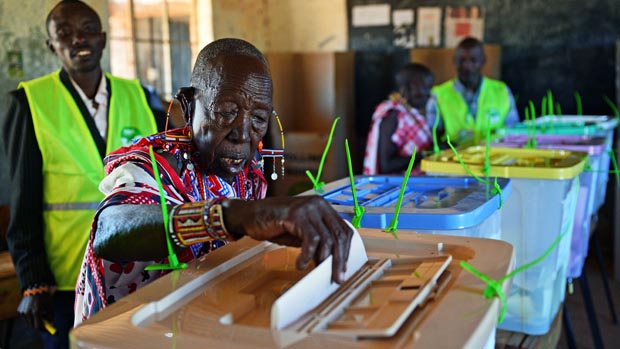Kenya goes to polls hoping to avoid violent crisis of 2007
East African nation faces its most 'important and complicated' election after bloodshed of previous poll

A free daily email with the biggest news stories of the day – and the best features from TheWeek.com
You are now subscribed
Your newsletter sign-up was successful
KENYA'S GENERAL election got off to a bloody start yesterday when at least four policemen were hacked to death by a gang armed with machetes in the coastal town of Kilifi. The incident – the day before polls opened – is a stark reminder of the violence unleashed by the 2007 election which left 1,100 dead and forced 600,000 people to flee their homes. Here's why today's election has been called the most "important and complicated" in the East African nation's 50-year history.
The events of 2007-2008 still haunt the country. Mwai Kibaki was declared the winner of the December 2007 poll, but his opponents claimed the vote had been manipulated. The dispute unleashed a wave of "ethnically targeted" violence that left at least 1,100 people dead and Kenya in the grip of what the BBC calls its "worst political crisis since it gained independence in 1963".
There are clear signs that the election may again trigger widespread violence. The top two presidential candidates - Uhuru Kenyatta and Raila Odinga - have a long history of strained relations and the result is likely to be as close as it was in 2007. The BBC says tensions in the country have risen again since the 2007-2008 crisis and "episodes of inter-ethnic violence, killings and the use of hate speech have increased". These events are a warning the country could "descend into violence worse than the crisis around the disputed general elections in December 2007", it says.
The Week
Escape your echo chamber. Get the facts behind the news, plus analysis from multiple perspectives.

Sign up for The Week's Free Newsletters
From our morning news briefing to a weekly Good News Newsletter, get the best of The Week delivered directly to your inbox.
From our morning news briefing to a weekly Good News Newsletter, get the best of The Week delivered directly to your inbox.
The police are braced for attacks on several fronts. Kenyan police are on a high state of alert because they believe voting will be disrupted by "criminals" dressed as police officers. The election is also likely to be disrupted by attacks by Somali militants and other tribal and political groups.
The man likely to be elected president is hugely controversial. Opinion polls suggest that 51-year-old Kenyatta will emerge victorious after today's poll. The Guardian points out that the US-educated politician is among four Kenyans facing international criminal court charges for "engineering" the ethnic violence that engulfed the country five years ago. Prosecutors accuse him of bankrolling the outlawed militia group Mungiki as it carried out revenge attacks.
If Kenyatta wins the world will be in "uncharted diplomatic waters". If he is victorious, Kenyatta will have the dubious honour of being the first democratically elected leader indicted by the ICC. The Guardian says that would be a particularly acute "diplomatic headache" because Kenya is a "key western ally, not least in the fight against terrorism in neighbouring Somalia".
A free daily email with the biggest news stories of the day – and the best features from TheWeek.com
-
 Palestine Action and the trouble with defining terrorism
Palestine Action and the trouble with defining terrorismIn the Spotlight The issues with proscribing the group ‘became apparent as soon as the police began putting it into practice’
-
 Why is the Trump administration talking about ‘Western civilization’?
Why is the Trump administration talking about ‘Western civilization’?Talking Points Rubio says Europe, US bonded by religion and ancestry
-
 Quentin Deranque: a student’s death energizes the French far right
Quentin Deranque: a student’s death energizes the French far rightIN THE SPOTLIGHT Reactions to the violent killing of an ultraconservative activist offer a glimpse at the culture wars roiling France ahead of next year’s elections
-
 Epstein files topple law CEO, roil UK government
Epstein files topple law CEO, roil UK governmentSpeed Read Peter Mandelson, Britain’s former ambassador to the US, is caught up in the scandal
-
 Iran and US prepare to meet after skirmishes
Iran and US prepare to meet after skirmishesSpeed Read The incident comes amid heightened tensions in the Middle East
-
 Israel retrieves final hostage’s body from Gaza
Israel retrieves final hostage’s body from GazaSpeed Read The 24-year-old police officer was killed during the initial Hamas attack
-
 China’s Xi targets top general in growing purge
China’s Xi targets top general in growing purgeSpeed Read Zhang Youxia is being investigated over ‘grave violations’ of the law
-
 Panama and Canada are negotiating over a crucial copper mine
Panama and Canada are negotiating over a crucial copper mineIn the Spotlight Panama is set to make a final decision on the mine this summer
-
 Why Greenland’s natural resources are nearly impossible to mine
Why Greenland’s natural resources are nearly impossible to mineThe Explainer The country’s natural landscape makes the task extremely difficult
-
 Iran cuts internet as protests escalate
Iran cuts internet as protests escalateSpeed Reada Government buildings across the country have been set on fire
-
 US nabs ‘shadow’ tanker claimed by Russia
US nabs ‘shadow’ tanker claimed by RussiaSpeed Read The ship was one of two vessels seized by the US military